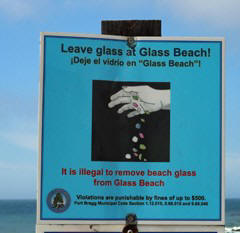 Sand Dollar Sea Glass
Sand Dollar Sea GlassHandmade Jewelry and Gifts
Wire Wrapped and Drilled Designs





 Sand Dollar Sea Glass
Sand Dollar Sea Glass
Handmade Jewelry and Gifts
Wire Wrapped and Drilled Designs





Where, When and How to Find beach Glass
A comment I often hear is: “In all my trips to the beach, I have never
found a single piece of sea glass.” If you are a sea glass lover but
don’t seem to ever find any, here are a few tips.
Ask other hunters
Click to see my
reviews of
best glass beaches
and directions for how to get there.
Find the right type of beach
Everyone
loves beaches with clean, white sand. But, to find sea glass, you
should look for beaches with sections of “shingle,” small pebbles and
bits of broken shell. Most often, you will find that the bits of glass
are similar in size to the size of the surrounding pebbles. Click
in the thumbnail and see if you can locate the glass in the picture to
the left.
Pay attention to weather
Best sea glass hunting occurs immediately after a storm strong enough to shake up the shingle, especially if you are hunting in
an area that is often combed by others.
Check the tides
Obviously, more beach is exposed at low tide. When in an area where the
beach is combed by many others, I schedule my arrival to coincide with
high tide and walk the beach as the tide recedes, exposing the newly
uncovered glass.
Consider
beach history
The best sea glass beaches
are located where something has occurred which provides a source for the
glass. The most glass is found where there is a history of offshore
dumping. Another good source (especially here on the Texas Gulf Coast)
are areas that are hit with periodic storms that alter the coastline
and wash out roads and structures. Also, waterways that are
periodically dredged will often have "new" old glass.
Remember that
offshore dumping was banned everywhere in the United States after
the early 1970's, so you must find population centers that existed
long enough before this time to allow for significant accumulation
of glass. Prime spots are former military bases (such as was
the case in Vieques and Fort Bragg)
and known civilian dump sites (as in
Port Townsend). In some locales, locals and visitors are
encouraged to "seed" glass beaches by throwing glass into the ocean,
but this has two major drawbacks. New glass remains sharp
for years or decades, so it is a hazard to small bare feet and is
not useful or attractive to sea glass collectors, and throwing glass
into the ocean (even glass found on the beach) is illegal.
Respect the locals
 It may be hard to believe, but some communities show
a marked hostility to beach glass seekers. For instance, at Glass
Beach near Fort Bragg in California, it is illegal to remove glass from the
beach area. Be sure that the community is open to glass hunting.
There are plenty of glass beach areas where hunters are welcome and
keeping one's finds is perfectly legal.
It may be hard to believe, but some communities show
a marked hostility to beach glass seekers. For instance, at Glass
Beach near Fort Bragg in California, it is illegal to remove glass from the
beach area. Be sure that the community is open to glass hunting.
There are plenty of glass beach areas where hunters are welcome and
keeping one's finds is perfectly legal.
Go the extra mile
Beach glass hunting has become so popular that glass
is more scarce on heavily traveled beaches. A hike or climb to an area
less accessible or a visit during the off-season when tourists are scarce sometimes pays dividends.